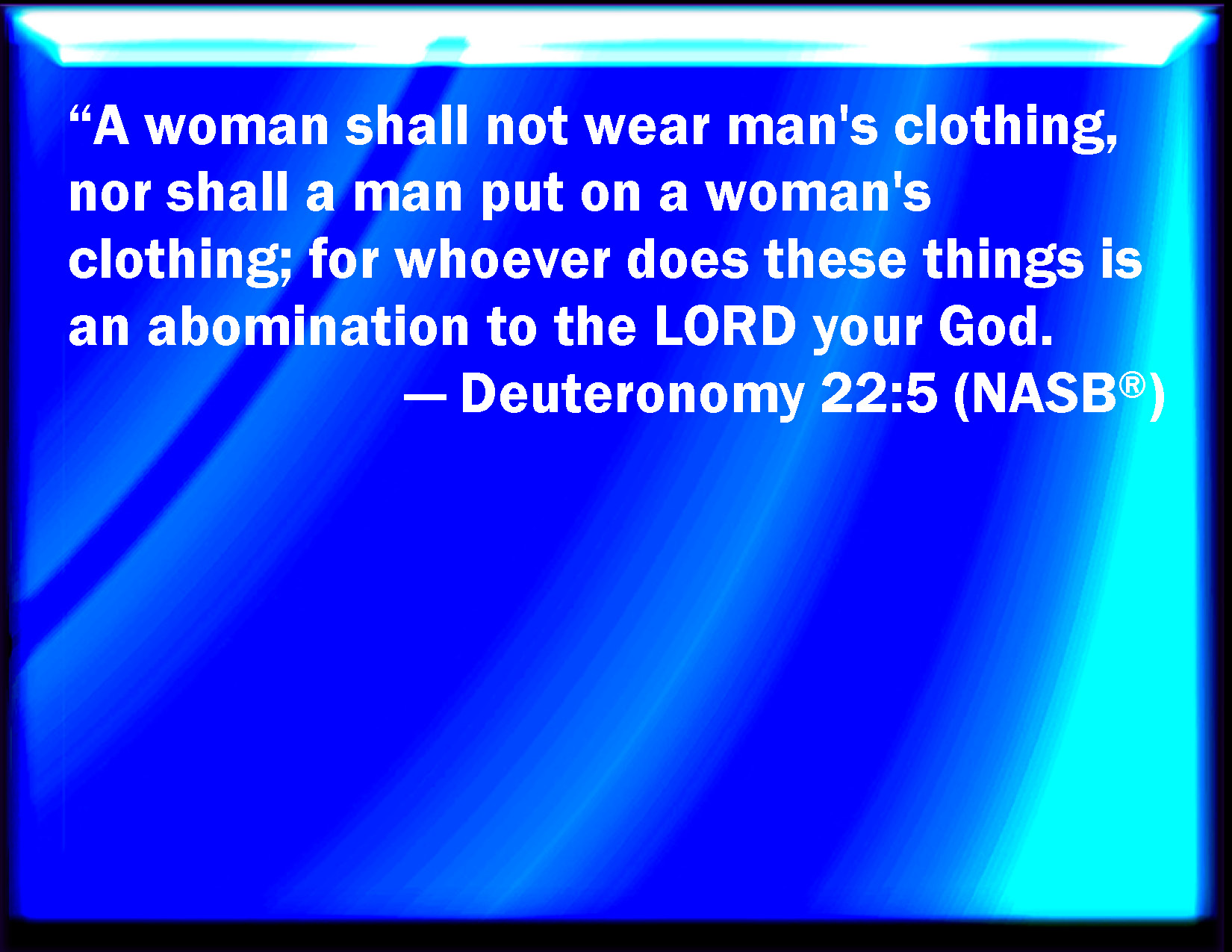Let’s dive into one of the most intriguing verses in the Bible: Deuteronomy 22:5. It’s a verse that’s sparked debates, inspired discussions, and left many scratching their heads. What’s the deal with this verse? Is it still relevant today? Or is it just another ancient rule that doesn’t apply to modern times? Stick around, because we’re about to break it down like a pro!
This verse has been the subject of countless interpretations, and for good reason. Deuteronomy 22:5 is all about gender roles, clothing, and societal norms. Sounds like a recipe for controversy, right? But before we jump into the deep end, let’s set the stage. This verse isn’t just some random rule; it’s part of a larger legal framework in the Bible that outlines how people should live their lives. So, buckle up, because we’re about to explore the meaning behind this verse and why it matters.
Now, here’s the deal: Deuteronomy 22:5 isn’t just for theologians or historians. It’s for anyone who’s curious about the intersection of faith, culture, and identity. Whether you’re a devout Christian, a history buff, or just someone looking to expand their knowledge, this article’s got something for you. So, let’s get started and unravel the mysteries of this verse!
- Unraveling The Mystery Was Molly Noblitt Stabbed In 2024
- Exploring The Life And Achievements Of Molly Niblitt
Understanding the Context of Deuteronomy 22
Before we zoom in on Deuteronomy 22:5, it’s important to understand the bigger picture. This chapter is packed with laws and regulations that governed life in ancient Israel. Think of it as the rulebook for a community trying to live in harmony with God. Some of these laws might seem outdated or even strange to us today, but back then, they were the blueprint for a just and orderly society.
Deuteronomy 22 covers a wide range of topics, from protecting the innocent to ensuring fair treatment for all. It touches on issues like property rights, marital fidelity, and even animal welfare. But what does all this have to do with Deuteronomy 22:5? Well, this verse fits right into the theme of maintaining boundaries and respecting differences. It’s not just about clothes; it’s about identity and order in a world where chaos could easily take over.
Why Was This Law Important in Ancient Times?
In ancient Israel, clothing wasn’t just a fashion statement. It was a powerful symbol of identity, status, and even morality. Men and women wore distinct garments that reflected their roles in society. This wasn’t about being sexist or oppressive; it was about clarity and structure. In a world without modern technology or communication, these visual cues were essential for maintaining social order.
- Amanda Balionis A Deep Dive Into Her Life And Kids
- Unveiling The Latest In Molly Noblitt News A Journey Through Her Life And Career
Deuteronomy 22:5 specifically addresses the issue of cross-dressing, which was seen as a violation of these boundaries. But why was this such a big deal? Well, in a society where roles were clearly defined, blurring the lines between genders could lead to confusion, chaos, and even moral decay. This verse was a way of saying, “Hey, let’s keep things simple and straightforward.”
Breaking Down Deuteronomy 22:5 Meaning
So, what exactly does Deuteronomy 22:5 say? The verse reads, “A woman must not wear men’s clothing, nor a man wear women’s clothing, for the Lord your God detests anyone who does this.” At first glance, it might seem pretty straightforward, but there’s a lot more going on beneath the surface.
Let’s start with the obvious: this verse is talking about clothing. But it’s not just about fashion; it’s about identity. In ancient times, clothing was a powerful symbol of who you were and where you belonged. Crossing these boundaries wasn’t just a fashion faux pas; it was seen as a threat to the social order. This verse was a way of reinforcing the importance of staying true to who you are and respecting the roles assigned to you by God.
What Does “Detests” Really Mean?
The word “detests” in this verse is often misunderstood. It doesn’t mean that God hates people who cross-dress; it means that this behavior is seen as a violation of the natural order. In the Bible, the word “detest” is often used to describe things that go against God’s design for the world. It’s not about judgment or condemnation; it’s about maintaining harmony and balance.
Think of it like this: if you mix oil and water, they don’t blend well. Similarly, in ancient Israel, mixing gender roles was seen as a disruption of the natural order. This verse was a way of reminding people to stay true to their roles and responsibilities in society.
Modern Interpretations of Deuteronomy 22:5
Fast-forward to today, and Deuteronomy 22:5 takes on a whole new meaning. In a world where gender norms are constantly evolving, this verse can feel outdated or even irrelevant. But is it really? Let’s explore how this ancient law applies to modern life.
Some people argue that Deuteronomy 22:5 is no longer applicable because our understanding of gender has changed. Others believe that the underlying principle of respecting boundaries and maintaining order is still relevant today. It’s a debate that’s not going away anytime soon, but one thing’s for sure: this verse challenges us to think critically about identity and expression.
How Does This Verse Relate to Modern Gender Issues?
In today’s world, gender is a complex and multifaceted topic. People express their identity in countless ways, and clothing is just one of them. Deuteronomy 22:5 can be seen as a reminder to respect each other’s choices and boundaries, even when they differ from our own. It’s not about enforcing rigid rules; it’s about fostering understanding and empathy.
For example, in many cultures, traditional clothing plays a vital role in identity and community. Deuteronomy 22:5 can be seen as a call to honor these traditions while also respecting individual expression. It’s a delicate balance, but one that’s worth striving for in a diverse and ever-changing world.
Historical Perspectives on Deuteronomy 22:5
To truly understand Deuteronomy 22:5, we need to look at how it’s been interpreted throughout history. Over the centuries, scholars, theologians, and everyday people have wrestled with this verse, offering a wide range of perspectives. Some have taken it literally, while others have seen it as a metaphor for broader principles.
One of the most interesting historical perspectives comes from Jewish tradition. In Jewish law, Deuteronomy 22:5 is often interpreted as a prohibition against deception or misleading behavior. This means that the verse isn’t just about clothing; it’s about honesty and integrity in all aspects of life. It’s a reminder that our actions should always align with our true selves.
How Have Christian Theologians Viewed This Verse?
Christian theologians have also weighed in on Deuteronomy 22:5, offering a variety of interpretations. Some have seen it as a call to modesty and humility, while others have focused on the importance of respecting God’s design for creation. One common theme among Christian interpretations is the idea that this verse is about honoring the distinctions God has made between men and women.
However, it’s important to note that not all Christians agree on how to apply this verse today. Some believe it’s still a binding law, while others see it as a cultural guideline that doesn’t apply to modern times. This diversity of thought is a testament to the richness and complexity of the Bible.
Practical Applications of Deuteronomy 22:5
So, how can we apply Deuteronomy 22:5 to our lives today? While the verse itself might seem outdated, its underlying principles can still offer guidance in a modern context. Here are a few practical takeaways:
- Respect boundaries: Whether it’s in relationships, workplaces, or communities, respecting boundaries is key to maintaining harmony.
- Honor traditions: While it’s important to adapt to changing times, we shouldn’t forget the value of cultural and religious traditions.
- Promote understanding: In a world where differences can lead to conflict, promoting understanding and empathy is more important than ever.
These principles can be applied in countless ways, from how we dress to how we interact with others. Deuteronomy 22:5 may not have all the answers, but it can certainly spark meaningful conversations and reflections.
How Can This Verse Guide Modern Christians?
For Christians, Deuteronomy 22:5 can be a reminder to live authentically and in accordance with God’s design. It’s not about enforcing rigid rules; it’s about cultivating a life of integrity and purpose. This verse can also inspire us to be more thoughtful and intentional in how we express ourselves and relate to others.
At its core, Deuteronomy 22:5 is about honoring the distinctions God has made while also recognizing the value of individual expression. It’s a balancing act that requires wisdom, humility, and a deep understanding of both Scripture and culture.
Common Misconceptions About Deuteronomy 22:5
Like many Bible verses, Deuteronomy 22:5 has been the subject of misconceptions and misunderstandings. Some people see it as a judgmental law that condemns those who don’t conform to traditional gender roles. Others dismiss it as irrelevant or even harmful. But what’s the truth?
One common misconception is that Deuteronomy 22:5 is about enforcing strict dress codes. While clothing is certainly part of the equation, the verse is really about identity and order. It’s not about shaming or judging others; it’s about respecting the boundaries God has set in place.
Why Is This Verse Often Misunderstood?
Part of the reason Deuteronomy 22:5 is misunderstood is because it’s rooted in a cultural context that’s vastly different from our own. In ancient times, clothing was a powerful symbol of identity and status. Today, fashion is more about personal expression and creativity. This shift in perspective can make it hard to fully grasp the meaning behind this verse.
Another factor is the way this verse has been used—or misused—in the past. Some people have weaponized it to condemn or control others, which goes against the spirit of love and grace that’s central to Christianity. It’s important to approach this verse with a heart of understanding and a willingness to learn.
Deuteronomy 22:5 and Cultural Relevance
As we’ve seen, Deuteronomy 22:5 is deeply rooted in the cultural context of ancient Israel. But does that mean it has no relevance today? Not necessarily. While the specific laws and customs of that time may not apply to us directly, the principles behind them can still offer valuable insights.
In a world where identity and expression are more important than ever, Deuteronomy 22:5 can serve as a reminder to honor the distinctions that make us unique while also celebrating the diversity that enriches our lives. It’s a call to balance tradition with innovation, order with creativity, and structure with freedom.
How Can We Bridge the Gap Between Ancient Laws and Modern Life?
Bridging the gap between ancient laws and modern life requires a willingness to think critically and creatively. It’s about finding the timeless truths that underpin these laws and applying them in ways that make sense today. For example, while we may not follow the specific dress codes outlined in Deuteronomy 22:5, we can still embrace the principles of respect, integrity, and authenticity that it represents.
This approach allows us to honor the past while also embracing the future. It’s a way of staying true to our roots while also growing and evolving as individuals and communities.
Conclusion: What Does Deuteronomy 22:5 Mean for Us Today?
In conclusion, Deuteronomy 22:5 is more than just a verse about clothing. It’s a reminder to live authentically, respect boundaries, and honor the distinctions God has made. While the cultural context of this verse may be different from our own, its underlying principles are still relevant today.
So, what’s the takeaway? Whether you’re a theologian, a history buff, or just someone looking to expand your knowledge, Deuteronomy 22:5 offers valuable insights into the intersection of faith, culture, and identity. It challenges us to think critically, act compassionately, and live with purpose. And isn’t that what life’s all about?
Now, it’s your turn! Share your thoughts, ask questions, or check out other articles on our site. Let’s keep the conversation going and explore the rich tapestry of faith and culture together!
Table of Contents


